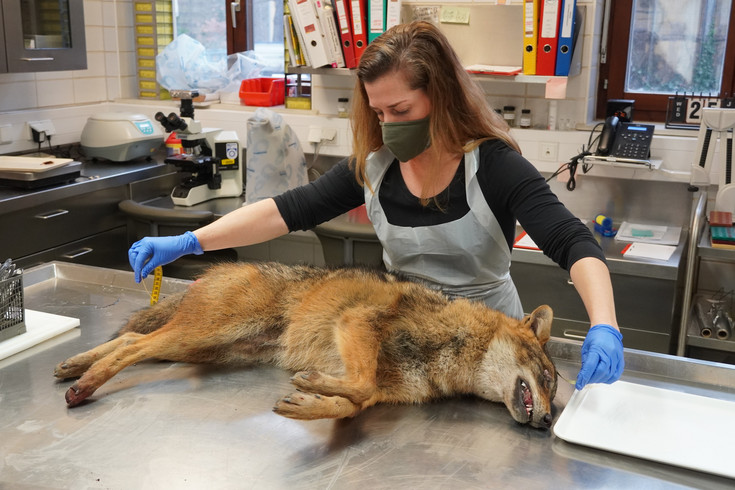27.01.2023 - First confirmed record of the golden jackal in Vienna

Jennifer Hatlauf, head of the golden jackal project at BOKU, examining the first golden jackal detected in Vienna - a 12-kilogram male.
The federal capital is now officially enriched by an interesting animal species: the golden jackal (Canis aureus), spreading naturally from its original range in south-eastern Europe, is a dog-like animal and slightly larger than a fox. On 25 January, a specimen was the victim of a traffic accident in the north of Vienna - a historical record that is a great source of information for science. At the University of Natural Resources and Life Sciences Vienna, a project to study these shy animals has been running since 2015.
An interesting species is spreading
Until the beginning of 2023, the occurrence of golden jackals (Canis aureus) could be confirmed in all provinces in Austria - except for Vorarlberg and Vienna. This has now changed. Verbal indications of sightings of golden jackals in Vienna had existed for a long time - but undoubted proof had been lacking until now. All photos submitted so far turned out to be foxes on closer inspection. "For the untrained eye, foxes and golden jackals are easy to confuse. The distinguishing features are, among others, the clearly shorter tail of the golden jackal and its light-coloured ears. For a clear scientific confirmation, a photo, video or the body of a dead animal is needed," explains Dr. Jennifer Hatlauf from the University of Natural Resources and Applied Life Sciences Vienna, who has been following (supposed) clues from Vienna for many years.
A historic day
On 25 January 2023, incontrovertible proof was finally provided: shortly before 9 a.m., a report arrived at the Golden Jackal Project Austria about a roadkill in the north of Vienna. Fast action was taken and thanks to good cooperation with the authorities, the dead animal was recovered in time and scientifically examined. The official confirmation followed by Jennifer Hatlauf, who heads the golden jackal project at BOKU: "It is indeed a golden jackal - and thus the first confirmed evidence in Vienna!".
The Viennese Forestry Director OSR Dipl.-Ing. Andreas Januskovecz is also pleased about the news he has been waiting for for years: "The now confirmed occurrence of a golden jackal in Vienna - even if the animal was unfortunately killed in a traffic accident - does not surprise me. Up to now, golden jackals in Europe were mainly at home in the Balkans and to the south-east. The strong increase in the average annual temperature over the past few years due to the climate crisis, especially in and around Vienna, favours the immigration of this wild species."
Vienna also has a high quality of life for golden jackals
Golden jackals - smaller members of the dog family - like to use varied habitats, which the metropolis of Vienna has to offer in great diversity. In addition, national park areas and the extensive Vienna Woods offer retreats for the shy animals. Vienna is known for offering a lot of nature and a rich fauna habitat - which has now been enriched by another species.
Still very rare at the beginning of the 20th century, the golden jackal has been spreading naturally across Europe from its original habitat in the Balkans in recent decades. Since 1987 there have been isolated records in Austria. Since 2015, information and reports have been collected and coordinated by the Austrian Golden Jackal Project, which is based at the Institute of Wildlife Biology and Hunting Management at the University of Natural Resources and Applied Life Sciences, Vienna (BOKU). The initiator Jennifer Hatlauf is an internationally recognised expert on this species: "Its adaptability to different habitats as well as its opportunistic choice of food make the golden jackal very successful. There are now records as far away as Norway. It is not dangerous to humans and is very rarely seen, as it is very shy".
Importance of research
The scientific investigation of the Viennese golden jackal began immediately and revealed that it is a young male animal with a total weight of around 12 kilograms. Further analyses will follow in order to gain valuable insights into this still little-known species: "We want to learn more about the health status, the diet and the origin. Due to the dynamic spread of this species, the results are of great importance not only nationally but also internationally. We are working closely with colleagues across Europe to document, understand and develop sound research for societal issues and environmental protection," Hatlauf explains.
This important research work can be significantly supported by reporting sightings with photo or video evidence or - as in the current case - carcasses (killed animals or road victims). All information can be found on the website www.goldschakal.at.
The Austrian Golden Jackal Project has been running since 2015 at the Institute of Wildlife Biology and Hunting (IWJ), at the University of Natural Resources and Applied Life Sciences Vienna (BOKU), in order to systematically determine the presence of golden jackals in Austria, to establish monitoring standards and to conduct fundamental ecological research on this species. www.facebook.com/Goldschakalprojekt
www.youtube.com/channel/UCcG2NnLC56YA22ezjs1cY3w
Photos and videos
Download: https://bokubox.boku.ac.at/#818393a96c2f8193ecfb76414c9983ae
Photos of the Vienna golden jackal discovery on 25 January 2023 and initial scientific investigation by international golden jackal expert Dr. Jennifer Hatlauf (Institute of Wildlife Biology and Hunting Management, University of Natural Resources and Applied Life Sciences, Vienna) - for free use in the context of media coverage.
Scientific contact:
Dr. Jennifer Hatlauf
Institute of Wildlife Biology and Hunting Management
University of Natural Resources and Applied Life Sciences Vienna
email office@goldschakal.at
mobile: +43-650 500 2158
Tel.: +43-1-4765483200
